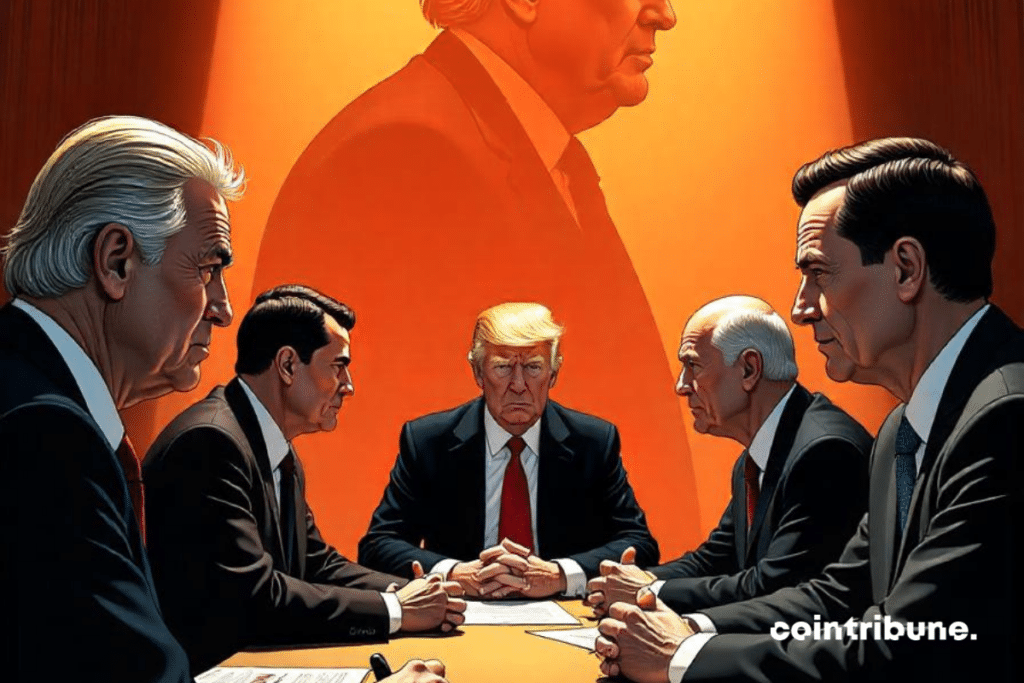Security And Trade : Europe’s Challenges With Trump’s Return
The election of Donald Trump for a second term as President of the United States could redefine the balance of power between Europe and its traditional ally across the Atlantic. In the face of this political upheaval, European leaders find themselves confronted with crucial questions about the future of their security, strategic autonomy, and economic partnership with the United States. As Europe is already weakened by internal tensions, Trump’s return revives concerns about a possible American disengagement in defense matters, as well as the threat of a trade war.

Trump and the Reassessment of American Commitment to NATO
The announcement of Donald Trump’s victory has provoked mixed reactions among European leaders, many of whom fear a repeat of his first term, marked by tensions over collective defense. In his initial statements, Trump repeated his demand for “fair contributions” from NATO allies, insisting that the United States “can no longer subsidize” the defense of “wealthy” nations that, according to him, benefit from American military commitment. This message, echoed by NATO Secretary General Mark Rutte, underscores Trump’s transactional approach, viewing NATO as a conditional alliance rather than an unconditional commitment to collective security. “The United States has 31 friends who protect their interests,” said Rutte clarified when discussing the contributions of other alliance countries.
These European leaders, like Emmanuel Macron and Ursula von der Leyen, emphasize the importance of transatlantic solidarity, but they also express concerns about the possibility of Trump reducing American support for Ukraine. While the elected president claims he can “resolve the war in Ukraine within 24 hours,” this position worries those who fear a compromise at Kyiv’s expense. “If it’s quick, it will be a defeat for Ukraine,” replied Ukrainian President Volodymyr Zelensky, who reminds that American support is essential to withstand the Russian offensive.
The Specter of a Trade War and Its Implications for the European Economy
Beyond security, Trump’s protectionist economic policy also threatens to trigger a trade war that could severely impact European economies. The elected president has promised to impose tariffs on all products imported from Europe, with direct threats against the German automotive industry. This aggressive approach adheres to his “America First” doctrine, and could provoke a European backlash, although EU leaders are divided on the best strategy to adopt. “The stability of our transatlantic economic relationship is vital for millions of jobs,” Ursula von der Leyen reminded in a message addressed to the elected president. She thus attempts to highlight the interdependence between the two economies.
This situation exacerbates the economic challenges for a Europe already plagued by internal vulnerabilities. A trade war could affect key sectors and slow down innovation in areas where Europe is trying to catch up with the United States and China. In this context of tensions, European leaders increasingly discuss the idea of enhancing their economic and strategic autonomy, although this remains complex to implement. The possibility of a new cycle of protectionism under Trump could be an opportunity for Europe to reassess its priorities regarding sovereignty, industrial competitiveness, and economic resilience in the face of crises.
If Europe does not seem completely caught off guard by Trump’s return, his victory could catalyze profound changes in transatlantic relations. Between weakened collective security and the possibility of an economic shock, the challenges posed by this new era are significant. By defining a more autonomous strategy, Europe could strengthen its independence, but this transition will require resources and political unity, which, for now, are still to be built. We hope that European leaders will implement the bold solutions from the Draghi report.
Maximize your Cointribune experience with our "Read to Earn" program! For every article you read, earn points and access exclusive rewards. Sign up now and start earning benefits.
Diplômé de Sciences Po Toulouse et titulaire d'une certification consultant blockchain délivrée par Alyra, j'ai rejoint l'aventure Cointribune en 2019. Convaincu du potentiel de la blockchain pour transformer de nombreux secteurs de l'économie, j'ai pris l'engagement de sensibiliser et d'informer le grand public sur cet écosystème en constante évolution. Mon objectif est de permettre à chacun de mieux comprendre la blockchain et de saisir les opportunités qu'elle offre. Je m'efforce chaque jour de fournir une analyse objective de l'actualité, de décrypter les tendances du marché, de relayer les dernières innovations technologiques et de mettre en perspective les enjeux économiques et sociétaux de cette révolution en marche.
The views, thoughts, and opinions expressed in this article belong solely to the author, and should not be taken as investment advice. Do your own research before taking any investment decisions.